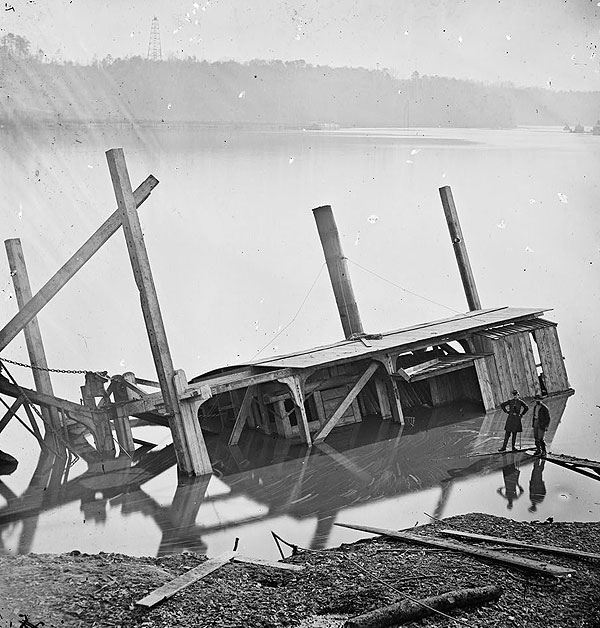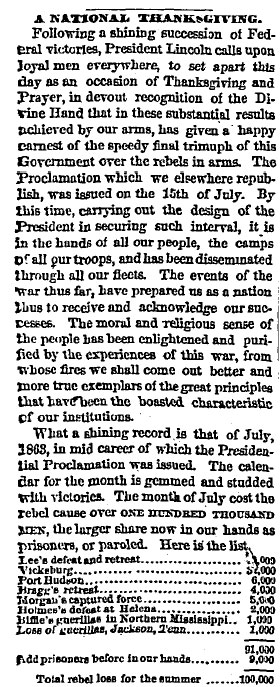
We all know the story of Thanksgiving, passed down to us by elementary teachers bearing construction paper, or The Addams Family, as first being celebrated by the Puritans in 1671… or the English in 1607… or the Spanish in 1565 at St. Augustine or 1598 in San Elizario, Texas. George Washington picked Thursday, November 26, 1789 as Thanksgiving Day, but didn't celebrate it again until 1795, and the tradition continued as a semi-official tradition depending on the state and time. By the mid 1800s, it was established enough that the Tribune didn't publish on November 26th 1858.
But Thanksgiving is a national holiday because of the Civil War, and from the beginning it was defiantly political; as Adam Goodheart wrote last year, it was "yet another instance in which the war elevated a newly powerful Union over states’ rights." Shortly after Lincoln's proclamation, the Tribune embraced the holiday in a military, patriotic spirit, giving thanks with a butcher's bill of rebels.

Credit is due to the journalist Sarah Hale, who sold Lincoln on the idea of a national holiday, but the spirit was in the air. The prior Thanksgiving, W.W. Patton of Chicago's First Congregational Church gave a Thanksgiving sermon you're unlikely to hear today, save perhaps from Elizabeth Warren: "The United States Tax, and the Duty of Paying it Cheerfully."
[W]hen the tax gatherer appears, it is in reality the government knocking at the door and putting the plain question: "Do you wish a government, sir? Do you wish law and protection? Do you wish a peaceful home, and a safe business, an opportunity to acquire, and the probability of retaining property and some degree of personal liberty?" … Paul knew what he wrote when he said, "I exhort, therefore, that, first of all, supplications, prayers, intercessions, and giving of thanks be made for all men; for kings and all that are in authority; that we may lead a quiet and peacble life in all godliness and honesty." Yes, pay your tax cheerfully and give thanks for civil government.
[snip]
We should pay our tax with cheerfulness, because the war, which occasions it, will in its results be worth all, and more than it costs. I do not mean that its pecuniary results will be a full reimbursement of all expenses, though I do not doubt the fact…. But what I have more particularly in mind results of a higher nature, whose worth is not to be compared in gold, and which the true life prosperity, honor and power of a nation consist…. Would wealth be of value where virtue was gone? And would America be other than a degraded and debauched queen, would not our mother wear a dishonored name forever, should she succumb to traitorous threats and violence in this base assault?
So it's more like "Sinners in the Hands of an Angry Internal Revenue Service," but you get the idea.
By the time the first national Thanksgiving came around, a Thanksgiving song, "Give Thanks All Ye People" was fresh out of the hymnals: a "metrical version of the President's Thanksgiving Proclamation" to be sung "in all the Churches in the city," in all its Union glory.



